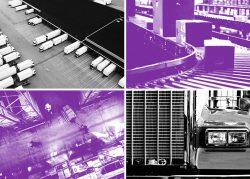Increasing truck traffic from a growing number of distribution warehouses that serve the booming e-commerce market has spawned a state bill that would keep them away from homes.
The proposed bill would require a 1,000-foot buffer between new warehouses larger than 100,000 square feet and homes, schools, health care centers, playgrounds and areas deemed to be at risk from air pollution attributed to warehouse-bound diesel trucks, the Riverside Press-Enterprise reported.
Assembly Bill 2840, launched by Assembly Majority Leader Eloise Gómez Reyes, D-Colton, would also require a “skilled and trained workforce” as defined by the state Public Contract Code to build warehouses. Local residents — the bill doesn’t specify who qualifies as local — would also be entitled to a set percentage of jobs once the warehouse opens.
With flat, vacant, cheap land, a blue-collar workforce and proximity to freeways, rail lines and the ports of Los Angeles and Long Beach, the Inland Empire has become ground zero for an ongoing logistics boom, and now ranked No. 3 in the U.S. for large warehouse leases.
It’s also become the locus for a pushback against warehouse growth and pollution.
The warehouses now employ thousands of residents in a region now teeming with mega-warehouses, often 1 million square feet or larger. With those jobs comes pollution from diesel trucks that help stock warehouses in inland valleys notorious for bad air quality.
The boom shows no sign of slowing, according to the newspaper, and warehouses are starting to push into residential areas as developers with vacant land seek to profit from the demand for more logistics space.
Reyes, whose district includes Bloomington, Colton, Grand Terrace, Fontana, Muscoy, Rialto and part of San Bernardino, acknowledges the logistic industry’s economic benefits. But she also said six of eight schools in Bloomington are or will be located close to a warehouse.
“You can be a neighbor, but we want you to be a good neighbor,” Reyes told the Press-Enterprise. “It isn’t being a good neighbor if you’re driving your diesel trucks through neighborhoods where these children are.”
The California Chamber of Commerce opposes the bill “because it exacerbates California’s existing supply chain problems,” said Adam Regele, CalChamber senior policy advocate.
He said the bill ignores the state’s robust environmental laws and regulations that mitigate all significant impacts. He added that the state needs more warehouses to help alleviate critical supply chain issues.
Regele called AB 2840 inconsistent with an executive order “which emphasizes that the health of supply and distribution chains across California is a matter of vital statewide importance.”
Reyes said the proposed buffer is set at 1,000 feet because that’s what the state attorney general’s office recommended. Former Attorney General Xavier Becerra suggested a 1,000-foot setback in mitigation measures his office proposed for warehouses.
[Riverside Press-Enterprise] – Dana Bartholomew
Read more


